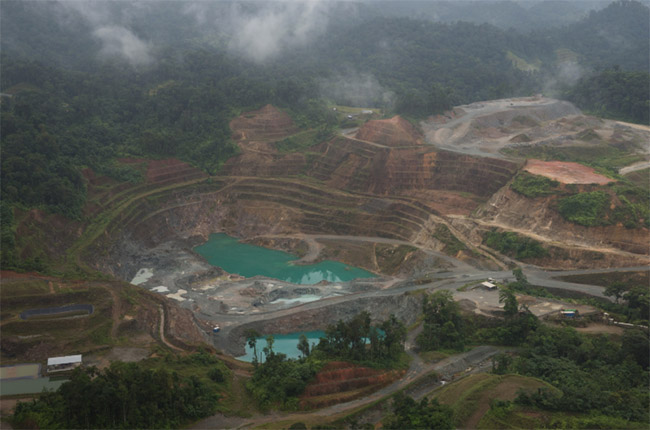Dialogue on Panama’s Future
Dialogue on Panama’s Future
by Heidi Weiskel, ELAW Staff Scientist
It had been two and a half years since I last stepped out of Tocumen International Airport into the hot, welcoming Panamanian evening. I shed the fleece, the English, and looked forward to a plate of plantains and coconut rice. It felt good to be back in this beautiful country. Pit lakes at the Cobre Panama mine.

Our colleagues at the Centro de Incidencia Ambiental (CIAM) invited ELAW board member Dr. Glenn Miller to be their keynote speaker at: “Environmental threats from extractive activities and their impact on human welfare,” a conference held at the City of Knowledge Training and Business Center.
CIAM works to advance environmental health in Panama at every level. They strengthen environmental laws, stop short-sighted projects, test water for toxics at local schools, and serve as a center of education, information, and dialogue about environmental protection across the country.
“People from the provinces and local communities call on us to help resolve concerns and seek environmental justice,” says Sonia Montenegro, CIAM Executive Director. “They see that we can help, and ELAW helps us help them more effectively.”
At the conference, Glenn spoke about the incredible dangers of open pit mining in tropical countries that experience heavy rainfall. Water management at mine sites in Panama is very difficult, and both tailings ponds and pit lakes can overtop the rims and release tremendously toxic material downstream into community drinking water or out into coral reefs and seagrass beds. Even without accidents, the sheer quantity of sediment that heads downstream with heavy rains from deforested areas around mines is seriously damaging.
Glenn invited Panamanians to come together to envision the kind of future they want for their country. Do they need open pit mining? Is there anywhere in the country it could be done responsibly? Are there other futures for Panama, rooted in tourism, or regional agricultural development, or connected to the imminent opening of the new locks of the Panama Canal?
Panama is a small country with lots of natural beauty. Like people everywhere, Panamanians want a healthy natural environment.
Communities in Panama now have an opportunity to make pivotal decisions about their future health, and CIAM and ELAW stand poised to help.
Learn more about our work and how you can support ELAW by visiting our website, Facebook, and Twitter.

